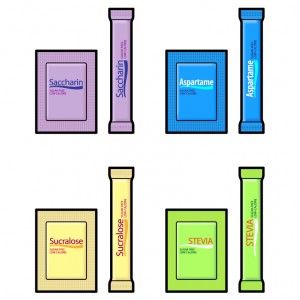Artificial Sweeteners: We’ve been taught to believe that using sugar substitutes will promote weight loss and maybe even prevent diabetes. 
Actually, it’s the exact opposite!
Sugar cravings are a huge obstacle to weight loss. The problem with substituting artificial sweeteners is that the body loses the ability to connect sweetness to excess caloric consumption, which leads to increased as opposed to reduced overall caloric intake. The artificial sweeteners are much sweeter than table sugar, so the addiction is fueled to an even greater extent.
A good analogy involves the use of salt. We all know people who pour salt on their food before they even taste it. They are so accustomed to consuming very salty foods that their threshold for salt is very high. The same happens with sugar, and due to the intense sweetness of these substitutes, you can’t escape from the cravings.
Aspartame (Nutrasweet) and Ace K: 200x sweeter than sugar
Saccharin: 300x sweeter
Splenda: 600X sweeter
There is very little research for any of these during pregnancy or in children.
In a recent 2013 medical journal the following was concluded:
“Accumulating evidence suggests that frequent consumers of these sugar substitutes may also be at increased risk of excessive weight gain, metabolic syndrome, type 2 diabetes, and cardiovascular disease.”
More research 2010:
“Using a rodent model, we have found that intake of foods or fluids containing non-nutritive sweeteners was accompanied by increased food intake, body weight gain, accumulation of body fat, and weaker caloric compensation, compared to consumption of foods and fluids containing glucose.”
Published in the Journal Appetite:
“In conclusion, greater weight gain was promoted by the use of saccharin or aspartame, compared with sucrose, and this weight gain was unrelated to caloric intake. We speculate that a decrease in energy expenditure or increase in fluid retention might be involved.”
And lastly, in a Psychology Journal:
“Recent results from both human epidemiological and experimental studies with animals suggest that intake of noncaloric sweeteners may promote, rather than protect against, weight gain and other disturbances of energy regulation. “
Instead of becoming reliant on these artificial sweeteners, try to revive your taste buds with the following:
Cinnamon: Actually helps to lower blood sugar
Pure Cacao powder: Low in carbs and high in antioxidants. Supports healthy blood vessels
Pure Vanilla Extract
Pureed Fruit
Shredded Coconut


Comments are closed.